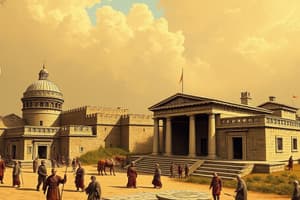Podcast
Questions and Answers
What does history primarily focus on?
What does history primarily focus on?
- The classification of different cultures
- The study of mythological tales
- The impact of future events on society
- The analysis of past events, particularly in human affairs (correct)
Which period is characterized by the rise of empires such as Rome?
Which period is characterized by the rise of empires such as Rome?
- Ancient History
- Classical Antiquity (correct)
- Modern History
- Prehistory
What are primary sources in historical study?
What are primary sources in historical study?
- Textbooks summarizing historical events
- Opinions and interpretations of historical events
- Original documents or artifacts created at the time being studied (correct)
- Modern analyses of past cultures
Which theme in historical study focuses on the effects of wars and treaties on societies?
Which theme in historical study focuses on the effects of wars and treaties on societies?
Which figure is known for leading the Indian independence movement through nonviolent resistance?
Which figure is known for leading the Indian independence movement through nonviolent resistance?
What aspect does historiography study?
What aspect does historiography study?
Which of the following is NOT generally considered a major period in history?
Which of the following is NOT generally considered a major period in history?
What is a common challenge faced in studying history?
What is a common challenge faced in studying history?
Flashcards are hidden until you start studying
Study Notes
Definition of History
- The study of past events, particularly in human affairs.
- Involves the analysis of historical documents, artifacts, and oral traditions.
Importance of History
- Helps understand how past actions shape present and future.
- Provides insights into human behavior, cultures, and societies.
Major Periods in History
-
Prehistory
- Time before written records.
- Includes the Paleolithic, Mesolithic, and Neolithic eras.
-
Ancient History
- Approximately 3000 BCE to 500 CE.
- Key civilizations: Mesopotamia, Ancient Egypt, Indus Valley, Ancient China, and Ancient Greece.
-
Classical Antiquity
- 500 BCE to 500 CE.
- Characterized by the rise of empires like Rome and developments in philosophy, politics, and the arts.
-
Middle Ages
- 500 CE to 1500 CE.
- Marked by feudalism, the rise of kingdoms, and the spread of religions like Christianity and Islam.
-
Modern History
- 1500 to present.
- Includes the Renaissance, Industrial Revolution, and contemporary world events.
Historical Methodology
- Primary Sources: Original documents or artifacts created at the time being studied (e.g., diaries, letters, photographs).
- Secondary Sources: Interpretations or analyses of primary sources (e.g., textbooks, articles).
- Chronology: The arrangement of events in the order they occurred.
Key Themes in Historical Study
- Politics and Power: Analysis of governments, statecraft, revolutions.
- Economics: Trade, resources, and economic systems.
- Culture: Art, religion, and social norms.
- Conflict: Wars, treaties, and their impacts on societies.
- Change and Continuity: What changes over time and what remains stable.
Important Historical Figures
- Alexander the Great: Conqueror and military tactician of the ancient world.
- Julius Caesar: Influential Roman general and statesman.
- Cleopatra: Last Pharaoh of Egypt, known for political alliances.
- Genghis Khan: Founder of the Mongol Empire, known for military prowess.
- Mahatma Gandhi: Leader of Indian independence movement using nonviolent resistance.
Interpretation of History
- History can be interpreted in various ways based on perspectives (e.g., social, economic, political).
- Historiography is the study of how history has been written and interpreted over time.
Challenges in Studying History
- Bias: Historical narratives may reflect the biases of their authors.
- Missing Records: Not all historical events are documented; oral histories can be incomplete.
- Perspective Change: The context of time can change the interpretation of historical events.
Conclusion
- History is a vital discipline that provides context for contemporary society.
- Understanding history enhances critical thinking and analytical skills.
Definition of History
- The study of past events, particularly in human affairs.
- Involves analyzing historical documents, artifacts, and oral traditions.
Importance of History
- Helps understand how past actions shape the present and future.
- Provides insights into human behavior, cultures, and societies.
Major Periods in History
- Prehistory: Time before written records, including the Paleolithic, Mesolithic, and Neolithic eras.
- Ancient History: Approximately 3000 BCE to 500 CE, with key civilizations such as Mesopotamia, Ancient Egypt, the Indus Valley, Ancient China, and Ancient Greece.
- Classical Antiquity: 500 BCE to 500 CE, characterized by the rise of empires like Rome and developments in philosophy, politics, and the arts.
- Middle Ages: 500 CE to 1500 CE, marked by feudalism, the rise of kingdoms, and the spread of religions like Christianity and Islam.
- Modern History: 1500 to present, encompassing the Renaissance, Industrial Revolution, and contemporary world events.
Historical Methodology
- Primary Sources: Original documents or artifacts created at the time being studied like diaries, letters, or photographs.
- Secondary Sources: Interpretations or analyses of primary sources, such as textbooks or articles.
- Chronology: The arrangement of events in the order they occurred.
Key Themes in Historical Study
- Politics and Power: Analysis of governments, statecraft, and revolutions.
- Economics: Trade, resources, and economic systems.
- Culture: Art, religion, and social norms.
- Conflict: Wars, treaties, and their impacts on societies.
- Change and Continuity: Examining what changes over time and what remains stable.
Important Historical Figures
- Alexander the Great: Conqueror and military tactician of the ancient world.
- Julius Caesar: Influential Roman general and statesman.
- Cleopatra: Last Pharaoh of Egypt, known for political alliances.
- Genghis Khan: Founder of the Mongol Empire, renowned for military prowess.
- Mahatma Gandhi: Leader of the Indian independence movement, utilizing nonviolent resistance.
Interpretation of History
- History can be interpreted in various ways based on perspectives (e.g., social, economic, political).
- Historiography is the study of how history has been written and interpreted over time.
Challenges in Studying History
- Bias: Historical narratives may reflect the biases of their authors.
- Missing Records: Not all historical events are documented, and oral histories can be incomplete.
- Perspective Change: The context of time can change the interpretation of historical events.
Conclusion
- History is a crucial discipline that provides context for contemporary society.
- Understanding history enhances critical thinking and analytical skills.
Studying That Suits You
Use AI to generate personalized quizzes and flashcards to suit your learning preferences.




